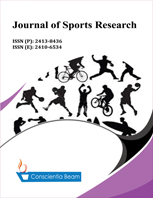Effects of Orienteering Game on Directional Relationships and Inhibitory Control in Children 7-8 Aged
DOI:
https://doi.org/10.18488/journal.90.2021.82.64.74Abstract
The spatial orientation, ability is very important for the child, for the development of its executive functions such as inhibitory control and directional skills. In fact, the role of play as a locomotive for learning and motivation is very imperative in this age group. Our methodological choice consists of offering a teaching program around the orientation game (OG) that takes place in the school playground. The aim of this study was to examine the effect of OG on directional skills and inhibitory control. The assessment was respectively conducted by Topological and Directional Relation (RTD) and Stroop Color-Word Test -Victoria version (SCWT). Primary school students (N = 40; 7.3 years) participated in this study. They were divided into two groups: an experimental group (20 students) and a control group (20 students). The first group followed a 12-week orienteering game (OG) program with 3 sessions of 40 minutes per week and the second a regular physical education program. The results of the experimental group show a clear improvement in most of the study variables.

